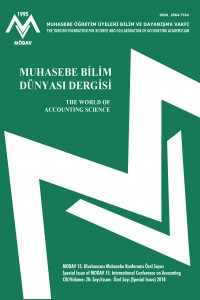Öz
Bu çalışmanın temel amacı, denetim faaliyetlerinin uzmanlık gerektiren hizmetler veya departmanlar dahilinde, varlığını ve katkısını dikkate alan, bir bütüncül vizyon ve bütüncül bir bakış açısı yaratmaktır. Aslında, bu çalışma, işletmenin genel felsefesine denetim teorilerinin ve uygulamalarının dahil edilmesine ilişkindir. Çalışmanın metodolojisi, Romanya açısından ve uluslararası açıdan bir işletmedeki felsefeyi dikkate alan anket ve pozitivist yaklaşımdan oluşmaktadır.
Çalışmada, denetimin önemini, hataların ya da faaliyetlerin boşluklarının ya da yerine getirilmemesinin değerlendirilmesi, kontrolü ve düzeltilmesinin yönetimsel işlevinin ana parçası olarak vurgulamaya çalıştım. Denetim, firmanın bugünü ve geleceği için tarafsız, bağımsız, profesyonel ve çok güvenilir bir araç olmalıdır. Çalışmanın içeriği, firmanın ortaya konuşunu ve onun varoluş felsefesini, denetim faaliyetini ve onun felsefesini ve nihayetinde denetimin, işletmenin karmaşık sistemini, nasıl faydalı bir biçimde nasıl desteklediğini kapsamaktadır.
Anahtar Kelimeler
İktisat Felsefesi Denetim Yönetimin Fonksiyonları Iyi Işleyiş
Kaynakça
- Bologna, S. 2018. The Rise of the European Self-Employed Workforce, Mimesis International, Sociology Series.
- Cascarino, R., S. D. Van Esch. 2005. Internal Auditing: An Integrated Approach, Lansdowne, Juta & Co. Ltd.
- Dai, Y. And M. Handley-Schachler. 2015. A Fundamental Weakness in Auditing: The Need for a Conspiracy Theory, www.sciencedirect.com, (Access Date: 06. 06. 2018).
- Deaconu, A. 2003. Economie d’entreprise, ASE Publishers, Bucuresti.
- Flint, D. 1988. Philosophy and Principles of Auditing, Macmillan Press Ltd.
- Gleim, Irvin N. 2004. Internal Audit Role in Governance, Risk and Control, Gleim Publications.
- Goza, N. M. 2005. Contributions of Lawrence B. Sawyer to the Profession of Internal Auditing, Editor University of Mississippi.
- Kline, B. 2018. Americans No Longer Want a Boss, www.lvb.com/article, (Access Date: 20. 05. 2018).
- Mautz, R. K & H. A. Sharaf. 1961. The Philosophy of Auditing, American Accounting Association Monograph 6, Sarasota.
- Penn, S. 2018. Six-Step Audit Process, www.smallbusiness.chron.com, (Access Date: 05. 06. 2018).
- Pickett, S. K. H. 2005. The Essential Handbook of Internal Auditing, John Wiley & Sons Ltd., England.
- Soltani, B. 2007. Auditing. An International Approach, Prentice Hall (an imprint of Pearson Educational Ltd.).
- Spiro, J. How to Create a Company Philosophy, www.inc.com/guides, (Access Date: 12. 05. 2018)
Öz
The main aim of this paper is that of creating an integrate vision, a holistic one, regarding the existence and contribution of audit activities. In fact, it’s about the inclusion of the auditing theories and practices in the general philosophy of the entity. The methodology consists of a survey and positivistic approach regarding the meaning of philosophy of an entity, both from Romanian case and international one. Also, I tried to highlight the importance of audit as main part of the managerial function of evaluation, control and correction of errors, or of activity’s gaps or not fulfillments. Auditing must be objective, independent, professional and a very reliable tool for the present and future of the firm. The contents comprise a part of firm presentation and its philosophy of existence, the audit activity and its philosophy and, finally, how auditing matter supports in a beneficial mode the complex system of functioning.
Anahtar Kelimeler
Economic Philosophy Audit Management Functions Well-Functioning
Kaynakça
- Bologna, S. 2018. The Rise of the European Self-Employed Workforce, Mimesis International, Sociology Series.
- Cascarino, R., S. D. Van Esch. 2005. Internal Auditing: An Integrated Approach, Lansdowne, Juta & Co. Ltd.
- Dai, Y. And M. Handley-Schachler. 2015. A Fundamental Weakness in Auditing: The Need for a Conspiracy Theory, www.sciencedirect.com, (Access Date: 06. 06. 2018).
- Deaconu, A. 2003. Economie d’entreprise, ASE Publishers, Bucuresti.
- Flint, D. 1988. Philosophy and Principles of Auditing, Macmillan Press Ltd.
- Gleim, Irvin N. 2004. Internal Audit Role in Governance, Risk and Control, Gleim Publications.
- Goza, N. M. 2005. Contributions of Lawrence B. Sawyer to the Profession of Internal Auditing, Editor University of Mississippi.
- Kline, B. 2018. Americans No Longer Want a Boss, www.lvb.com/article, (Access Date: 20. 05. 2018).
- Mautz, R. K & H. A. Sharaf. 1961. The Philosophy of Auditing, American Accounting Association Monograph 6, Sarasota.
- Penn, S. 2018. Six-Step Audit Process, www.smallbusiness.chron.com, (Access Date: 05. 06. 2018).
- Pickett, S. K. H. 2005. The Essential Handbook of Internal Auditing, John Wiley & Sons Ltd., England.
- Soltani, B. 2007. Auditing. An International Approach, Prentice Hall (an imprint of Pearson Educational Ltd.).
- Spiro, J. How to Create a Company Philosophy, www.inc.com/guides, (Access Date: 12. 05. 2018)
Ayrıntılar
| Birincil Dil | İngilizce |
|---|---|
| Bölüm | ANABÖLÜM |
| Yazarlar | |
| Yayımlanma Tarihi | 27 Aralık 2018 |
| Gönderilme Tarihi | 23 Haziran 2018 |
| Yayımlandığı Sayı | Yıl 2018 Cilt: 20 - MODAV 15. Uluslararası Muhasebe Konferansı Özel Sayısı |


